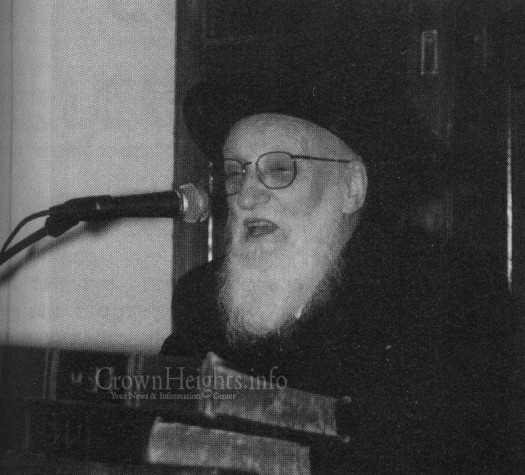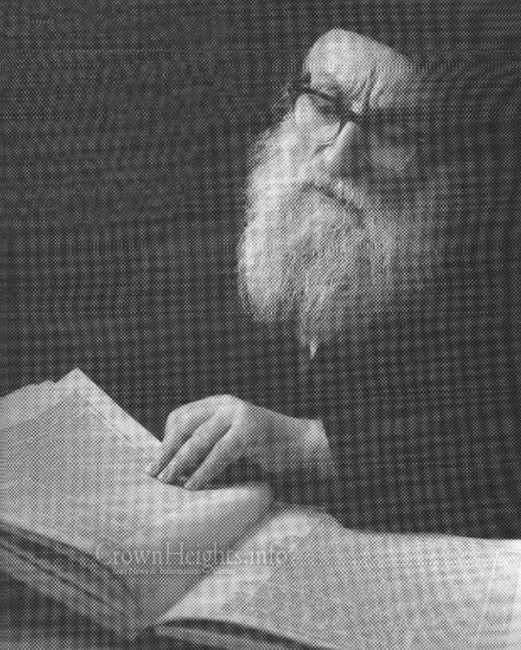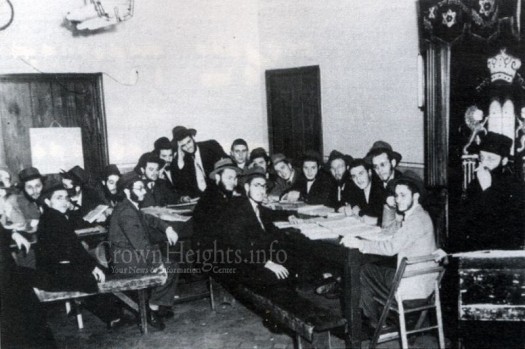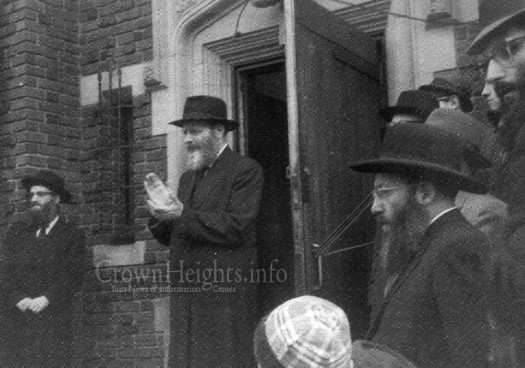
Our Heroes: Rabbo Chaim Meir Bukiet (1919-1998)
Hagaon Hachossid Horav Chaim Meir Bukiet was born on the 24th of Menachem Av 1919 in Wislica, Poland, the only child of Horav Hachossid Reb Avrohom Shmuel and Mrs. Rochel Bukiet.
The Previous Rebbe established many small chadorim across the Poland, including one in Chmielnik, the town where Chaim Meir was raised. One morning while passing the cheder Chaim Meir’s mother heard the Kol Torah and thought it would be a proper place for her son to learn. The young Chaim Meir learned there for a few years until his father sent him to Tomchei Tmimim in Warsaw, having first inquired about the yeshiva. Chaim Meir grew to be a brilliant and successful student.
Chaim Meir was a diligent student as well. Once asked what his hobbies were as a young child he answered, “I liked to learn what I understood.”
Chaim Meir continued to learn in the Lubavitch Yeshiva as he became older and as the yeshiva moved from Warsaw to Otwock, Poland, where he was among the elite students. At the age of seventeen he wrote a Torah discussion printed in Hatomim, a magazine published under the directorship of the Previous Rebbe.
In later years, one of his grandsons asked Reb Chaim Meir about the Torah article written at such a young age. Reb Chaim Meir recalled. “I wrote an essay on the Rambam and someone passed it around the study hall. It reached the hands of the Rosh Yeshiva, the Gaon and Chossid Rabbi Yehuda Eber, who was also one of the editors of Hatomim. He asked me if he could publish it and I agreed.”
The Rosh Yeshiva Reb Yehuda Eber would deliver a deep and analytical shiur and immediately after the conclusion of the shiur Reb Chaim Meir would review the shiur for the other students.
The students who were together with him in the famous Lubavitch Yeshiva in Otwock, Poland attested to how he would stay up throughout the night learning with his study partners. Rabbi Moshe Baitch, who was a student in the yeshiva, once related that he remembered how Reb Chaim Meir and Reb Shmuel Dovid Raichik used to learn together with great enthusiasm late into the night.
Concern for His Parents
While in yeshiva Reb Chaim Meir suffered from very bad headaches for a number of weeks. He visited the doctor in his town and was advised to get more sleep at night. He never told his parents, knowing that this would cause them concern and he didn’t want to worry them.
Living in Poland was not necessarily comfortable for Jews. Reb Chaim Meir responded to the question of whether he experienced anti-Semitism in Poland, with a personal experience. “I will share something that happened to me when I was a bochur in yeshiva. I was once standing in the courtyard of the yeshiva next to a tree, davening with deep concentration. Out of the blue a rock landed on my head. I turned around and there was a Polish boy standing there. I remember how they once surrounded the yeshiva and tried to break in. There were many other such occurrences.”
Previous Rebbe’s Instruction to Leave Poland
As WWII approached, Reb Chaim Meir returned home in order that his parents not worry about him. He received a letter from a dear friend of his, Reb Menachem Zev Greenglas, stating that the Previous Rebbe had instructed all the students to leave Poland and head for Vilna, then under Latvian control.
Reb Chaim Meir spoke about those days. “When I got the letter I showed it to my mother. She went to a Rabbi in the neighboring community. The Rabbi said that if the Rebbe would know what was happening at the borders [of Poland and Russia] he would not tell the students to flee toward the borders. My mother asked me to stay. I did not want to leave my parents alone and not knowing if the letter was accurate, I stayed. After a while I received a telegram that they were waiting for me in the yeshiva, to leave for Vilna according to the Rebbe’s instructions. I decided to go and packed a few small things. My father and I left, headed towards Russia. My ailing mother was unable to join us.
Leaving his Family
“It was snowing strongly that night. By the time we left the town my father realized that he couldn’t make it and told me that I should go on by myself. It was Purim Katan and on the way we met a few people. Together we experienced great miracles as we passed by the German soldiers. I arrived in Warsaw on Friday and stayed with a relative who was a great scholar. His whole family was there and there was no place for me to put down my head and sleep. After Shabbos I left his house and began wandering.”
Reb Zalman Bukiet, the Rebbe’s shliach in Boca Raton, Florida recalled. “My father’s mother was not comfortable separating from her only child and she did not take it well that he left. So great was her pain that she wrote a letter to the Rebbe after my father left Chmielnik stating, ‘Why did you take away my only son?’ When my father came to New York, someone told him about the letter and he took it to heart. He always felt bad that he had left his parents never to see them again.
In 1986 my father saw an ad publicizing a gathering of the members of the Chmielnik Jewish community. My father decided to go hoping to meet anyone who had information about his parents. He asked me to accompany him. We went and to my father’s astonishment, they were eating non-kosher food. We sat down and my father was asked to speak. He noted how they all had the merit to be saved from the war and added in astonishment, “And this is the manner in which you act now?!” We left immediately thereafter.
A few weeks later my father saw an ad for another gathering in a different location. After his previous experience he didn’t know if he should go. We finally decided to go and this time the meeting was composed of observant Jews. We sat down and they asked my father’s name, and he responded ‘Chaim Meir Bukiet’. Hearing the name, one particular individual related the following. ‘I was with your parents as we entered the train to the concentration camp. I remember I helped your father onto the train, as he was an older man. As I was helping him, he said ‘A dank G-t az Chaim Meir iz nisht do’, ‘Thank G-d that Chaim Meir is not here.’ I remember seeing my father’s face shine as he heard those words, and a big weight [of sorrow] was lifted from his shoulders.”
In an interview with the Kfar Chabad weekly, Reb Chaim Meir described his ordeal during WWII. In general, the torture and humiliation that the Warsaw Jews endured during the first days of the war was horrifying.
Searching for the Previous Rebbe
“The Germans would persecute families. For example, they would kidnap the husbands and send them away to work in factories for the German war effort. One night they arrested any Jewish woman that they found on the Warsaw streets. There were many acts of brutality against the Jews, collectively and individually.
The Previous Rebbe was then in Warsaw. When he heard that the Germans were searching for him, he hid in the home of Reb Hirshel Gurary.
A messenger came with the news that they were looking for the Rebbe. The message was relayed to the Rebbe, including the information that contacts had been established with people in the United States to rescue the Rebbe. The Rebbe advised that if a messenger came they should allow him into the Rebbe’s room. It was Shabbos, a knock on the door was heard, and Reb Hirshel Gurary got up to open the door. Representatives of the U.S. were at the door. Right then German agents came to the house as well. When they saw the American representatives the Germans left.
When I came to Warsaw the Previous Rebbe was still there. In order to pass from Warsaw into Russia, one needed to cross the Buk River to the side under Russian control. Rumor had it that the Russians were arresting all Polish citizens who crossed into Russia and were sending them to Siberia. We continued on our way having been directed by the Previous Rebbe.
We reached the boundary between the German occupied territory in Poland and Russia, around midnight. The river which was entirely frozen was the only way across. Suddenly we heard screaming and we became very fearful. We also could not locate the guide who was supposed to lead us across the border. Finally, a group of people, all equally lost in the night, gathered and decided to continue together without the guide.
We went through a cemetery into a small village, having no idea where we were. We knocked on the door of a non-Jew, who came out to us but did not allow us in. He informed us that we were already in Russian territory and we calmed down. He gave us directions and warned us not to be caught by the police.
Upon reaching the city of Ishishuk we eventually found the house of the Rav, also the town’s shochet, and he gave us directions. We smuggled ourselves into the train station, were able to purchase food and drink on the journey, and arrived in the city of Slonim.
It was night and all the streets were dark. After some searching we were successful in finding a shul, where to our joy we found chassidim sitting and Farbrenging in honor of Purim Koton. What a delight.
At that Farbrengen, someone recalled the Rebbe RaShaB’s Purim Farbrengen in 1917. When the communists took over Russia there were people who said that it wouldn’t last long. The Rebbe RaShaB then said, ‘When they persecute a Jewish body [the Jewish nation], Hashem does not have patience and does not remain silent, but when they begin with him [Hashem alone], he is patient.’
Visit from a Russian General during the Seder
From Slonim we walked along the Russian border to Vilna. Prior to my escape from Poland, I had corresponded with a student in Gluboka. When I reached his village I thought to myself, a Lubavitch shul is not worse than anywhere else, and decided to sleep there. A Russian general lived in the building that housed the shul but we had nowhere else to go. We remained in the village for Pesach and held the sedorim in the house of a chossid. The Russian general heard the sounds of the seder, entered the house and began crying. It turned out that he was a Jew. Indeed, when a person needs to fulfill a mission, Hashem sends him to the right place.
Arriving in Brisk & Unexpected Friends
We crossed the border and eventually came to Brisk where a Jewish woman, hearing that I was a student of Tomchei Tmimim, immediately invited me to her home. The family Gelstein was a prosperous one that owned a shoe and galoshes factory which they later sold for a good price.
When I entered their home, to my surprise I found Horav Arye Leib Kramer and Horav Shloma Hochler, two of my friends from Warsaw who were also en-route to Vilna. The Gelstein’s hachnosas orchim remains in my memory until this very day. The hosting of three students was a great risk but they did not take that into consideration and sacrificed themselves to host us. I recall how Mrs. Gelstein told us, ‘Children, feel at home’.
After a short stay, we decided to move although we did not know where to go. Our host supplied us with food for the trip, as well as some money to give to individuals in Vilna, which we sewed into our garments.
We came to an agreement with smugglers who took people across the border from Russia to Latvia. They wanted me to shave my beard in order not to raise the suspicions of the border guards. I objected and eventually they agreed that I didn’t have to. We designated a late hour of the night for the escape.
At night we entered the forest and met the smuggler. He led us to the middle of the forest where he handed us over to a non-Jewish woman who was to guide us the rest of the way. As soon as she saw us, she told us ‘You should pray that we are successful because it is a dangerous risk.’
It was Pesach Sheni when we came out of the forest and already daylight. We saw people walking in the distance. Fearing that they might shoot at us, we went back into the forest and remained there until the following evening.
That evening there was a full moon. Until now we had been walking in a desolate and abandoned area. We approached a village and the guide warned us to keep quiet lest we awaken the dogs and alert the border guards. That is how we entered the central street in the village. Suddenly it began raining and the guide pulled out a towel and a stick and smoothed out the footsteps that we had left in the dirt. After this risky but successful ordeal, the guide thanked Hashem because our safe passage, according to all logic, should not have succeeded.
Visas were obtained in a remarkable way from the Japanese consul in Russia, the illustrious and righteous Mr. Chiune Sugihara
Vilna
Reb Cham Meir continued. “We finally reached Vilna and felt comfortable enough to breathe freely. We knew that prior to WWII there was a Lubavitch yeshiva in Vilna, founded by Hachossid Horav Yitzchok Duber Ushpal, later to become a Rosh Yeshiva in the Lubavitch Yeshiva in Brooklyn. This encouraged many students to cross the border into Vilna. In total, there were thirty-nine students who managed to get through to Vilna.”
Horav Hachossid Reb Gershon Chanowitz, one of the students in Vilna, recalled the yeshiva in Vilna. “The Previous Rebbe sent the chossid Horav Yehoshua Eizik Baruch to be a mashpia in the yeshiva. When he came to Vilna he told us that he felt obligated to constantly repeat the message of the Previous Rebbe to chassidim in Poland. ‘I am not leaving. It is not an ocean that divides but [rather one that] connects. Emuna and hiskashrus are as they were, and Hashem should help that we should meet at the arrival of Moshiach.’
The mashpia Horav Baruch had such a genuine belief in the Previous Rebbe’s words, that two days before Rosh Hashana he blessed us that we should be with the Rebbe on Rosh Hashana. When we asked him how that was possible he responded, ‘How a telegraph and telephone works you do understand?!’
The Gaon Horav Chaim Ozer, the Rav of Vilna, who was also in charge of the Vaad Hayeshivos, organized places to house the students who came to Vilna.
One of the maggidei shiurim in the yeshiva was Horav Zalman, a nephew of the famous Gaon Horav Boruch Ber Lebowitz. During WWII students from many different backgrounds, such as the grandchildren of Horav Boruch Kamenitz and of the Chofetz Chaim, studied in Tomchei Tmimim.
Hachossid Horav Reb Mordechai Bryski remembered Reb Chaim Meir in Vilna.
“The studies in the yeshiva in Vilna continued in the Chabad Uptuv Shul which had a kitchen on the lower floor. The dormitory was in the women’s section. The dormitory made life easier, especially for the Tmimim who became ill. A number of diseases were circulating in Vilna and many Tmimim were bed-ridden. Reb Chaim Meir, who was always engrossed in his studies, stood out as an exceptionally generous person and devoted himself to each of the students who needed assistance.”
Japan
Hachossid Horav Reb Mordechai Bryski recalled:
“Many Tmimim went from Vilna to Japan. There was an American consulate in Russia but not in Vilna. Obtaining an affidavit for entry into the United States was very difficult. The students would request a visa for a ten-day stay in Japan in order to receive an affidavit, and when the visas came they would apply to extend their stay.”
Horav Chanowitz recalled. “The students came in groups to Japan. Although the community was Ashkenazic, the American Joint Distribution Committee worked there and we knew that without their assistance we would not be able to remain. The community of about thirty families supported and sustained the thousands of refugees. Most of the refugees were yeshiva students primarily from chassidic families, who stood out with the Ahavas Yisroel that they displayed to all. Lubavitch chassidim had a separate building which also contained the yeshiva. The Amshinover Rebbe lived on the top floor. The Previous Rebbe had already instructed Lubavitch chassidim in Vilna to turn to the Amshinover Rebbe when they had questions or needed guidance and to follow his advice.
When war between the United States and Japan broke out in 1941, the Japanese moved the Jewish refugees to Shanghai. Among the refugees who came to Shanghai was Reb Chaim Meir who continued his tradition of physically helping people, as well as sitting and learning with great diligence and davening with avoda, according to the tradition of Chabad chassidim to meditate and concentrate on every detail of the tefila.”
















